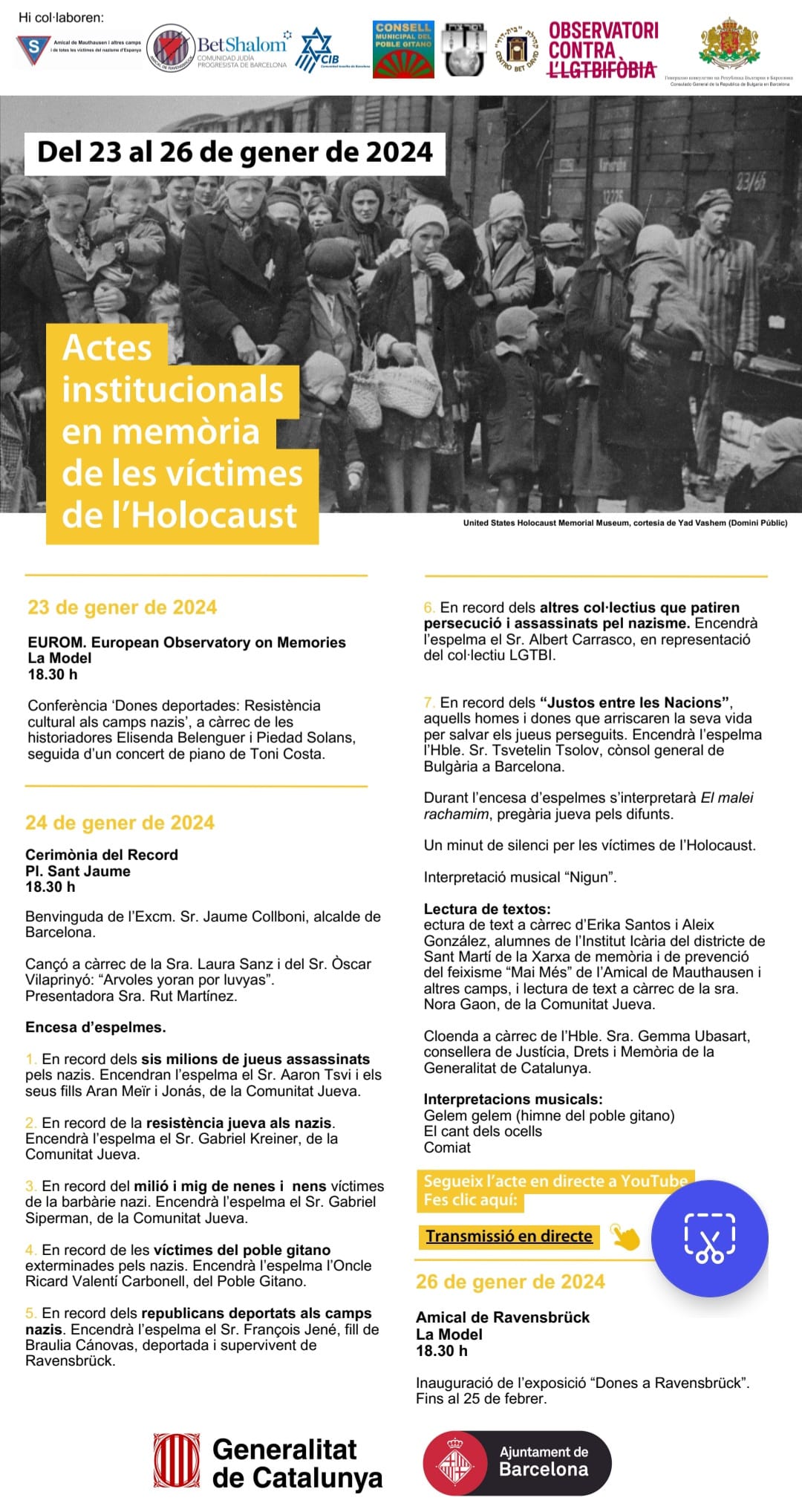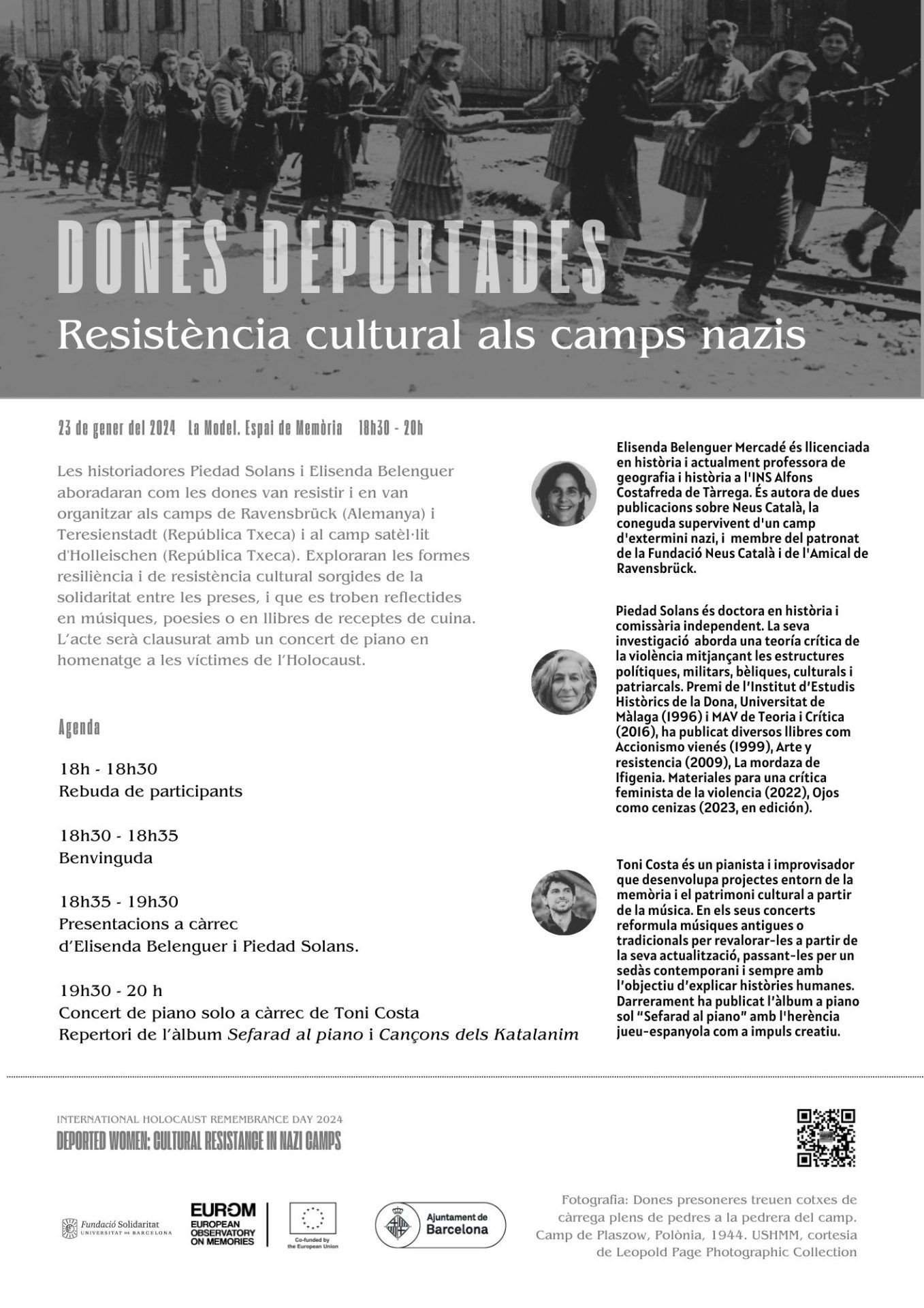How did women organize and resist in Nazi extermination camps? In this first activity of the year we invite you to explore the different forms and cultures of resistance, survival, and solidarity developed by inmates of the Ravensbrück (Germany) and Theresienstadt (Czech Republic) concentration camps.
The historian and art curator Piedad Solans will delve into the intricacies of this historical context, shedding light on the extraordinary efforts made by these women. Additionally, historian and biographer Elisenda Belenguer Mercadé, renowned for her work on Neus Català and Aurora Gómez, will share recent discoveries, including Neus Català’s receipts book from Ravensbrück.
As a tribute to the victims of the Holocaust, pianist Toni Costa will grace us with a solo piano concert. Costa’s repertoire features reinterpretations of traditional and anonymous songs, as well as well-known themes by various authors, all deeply connected to the Shoah across different regions of Europe.
Free entry. Pre-registration is recommended.
Background information
Conceived by the Nazis as vast extermination machinery, concentration camps subjected millions of people from across Europe to forced labor (slavery), disease, hunger, executions, medical experiments, gas chambers, and crematoriums. How did women resist in the camps, and how did they organize?
During this event, the speakers will address the forms of resistance, survival, and solidarity developed by female prisoners at Ravensbrück (Germany) and Theresienstadt (Czech Republic), including boycotting forced labor in factories, music, war hymns, popular songs, painting, and poetry. Some of those women were artists, writers, composers, philosophers; others were members of the Polish, Czech, Italian, or French Resistance, including communists, republicans, and Spanish anarchists exiled to France after the Republic’s defeat; some were Russian soldiers captured as prisoners. It was these women, accustomed to the struggle, who tended towards organizing solidarity in the camp.
About the Speakers
Piedad Solans is a Ph.D. in history and an independent curator. Her research addresses a critical theory of violence through political, military, war, cultural, and patriarchal structures. Awarded by the Institute of Historical Studies of Women, University of Malaga (1996), and MAV Award for Theory and Critique (2016), she has published several books such as Viennese Actionism (1999), Art and Resistance (2009), The Muzzle of Iphigenia. Materials for a feminist critique of violence (2022), Eyes like ashes (2023, in edition). She is the editor of Thinking, building, inhabiting (1999) and has directed publications such as War, violence and human rights, and Feminisms, exiles, narratives.
Elisenda Belenguer Mercadé, a graduate in history and currently a high school geography and history teacher at INS Alfons Costafreda in Tàrrega. Specialized in the recovery of women’s historical memory from a gender perspective, and currently a member of the board of the Neus Català Foundation and the association l’Amical de Ravensbrück. She is the author of two biographical publications, firstly, about Neus Català, the well-known survivor of a Nazi extermination camp, under the title “Neus Català, memory and struggle” (Pere Ardiaca Foundation, 2007) and secondly, about Aurora Gómez, secretary of the women of Comisiones Obreras de Catalunya (CCOO) titled: “Aurora Gómez: a life of commitment” (Comisiones Obreras de Catalunya, 2010).
About the Musician
Toni Costa is a pianist and improviser who develops projects around memory and cultural heritage through music. In his concerts, he reinterprets old or traditional music to revalue them through their updating, passing them through a contemporary filter and always with the aim of telling human stories. In this sense, Toni has presented projects around the Barcelona of the Universal Exhibition of 1929 or the legacy of Catalan Jews in our country. Recently, he has released the solo piano album “Sefarad al piano” with Jewish-Spanish heritage as a creative impulse.
Cover picture: Women prisoners pull dumpcars filled with stones in the camp quarry. Plaszow camp, Poland, 1944. USHMM, courtesy of Leopold Page Photographic Collection
Survey
This activity is co-financed by the European Commission and for its evaluation we kindly ask your collaboration in filling out this survey. It will take about 10 minutes, and you will need the information indicated below. Thank you very much!
- Reference of the Project: 101140481
- Kind of activity: Awareness raising
- Title: Holocaust Remembrance Day: Culture of resistance in women’s deportees camps
- Date of the activity: 23/01/2024
- Duration of the event in days: 1
- In Person
- Barcelona, La Model.




